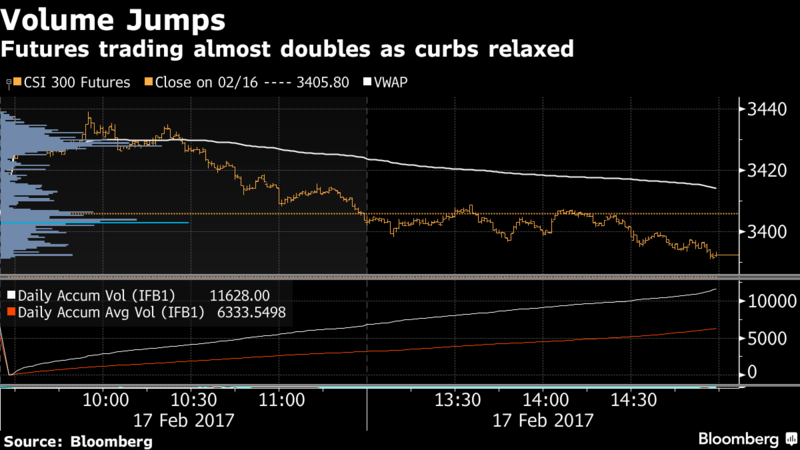Hong kong stock exchange volume
The Hong Kong stock exchange HKEx restored its closing auction system on Monday after a seven-year hiatus.
Here is what you need to know about the move. A closing auction is a process of setting a closing price for a security and allowing it to trade at that price. Such a mechanism can enable large institutional investors to buy stocks at a set price after markets close instead of trying to put in orders just before the close of trade when volatility can be high.
It's not uncommon, with stock exchanges in most developed markets, except Hong Kong, and many emerging markets providing for a closing auction of some sort. Among major emerging markets, only India and China don't have a similar system.
In early March of , as the global financial crisis was unfolding, shares of HSBC plunged more than 20 percent in one day, with much of the largely unexplained drop coming in the final minutes of the closing auction.
Because HSBC was heavily weighted in the Hang Seng Index , the benchmark also took a tumble. Although suspicions of market manipulation were never proven, the drop brought concerns about the closing auction front and center.
Traders had previously complained that securities would move sharply during the auction and that prices could be manipulated. That spurred HKEx to suspend use of the auction. HKEx was concerned about remaining competitive with other exchanges that offer the ability to trade at a security's closing price, something that institutional investors often require.
The exchange noted that trading at the closing price can be an investment mandate for many passive equity funds, representing around 10 percent of equity flows daily, a figure that can jump to more than 30 percent on days when funds rebalance to match an index.

Without allowing trade at the closing price, index funds can have more tracking errors, hurting investment returns, HKEx said in a presentation in June. Parry cited another reason to bring back the closing auction: Without the auction, the market saw a lot of volume into the last minute of trading to try to capture the closing price, he noted.
Many of the changes were meant to prevent gaming the system by either manipulating the eventual closing price or front-running it. One major change was only allowing securities to move by 5 percent, either up or down, during the auction period. A reference price would be set in the one minute period after the market close by taking the median of five nominal prices in the last minute of the regular trading session. Previously, the largest order for a share determined a stock's closing price, making it vulnerable to manipulation, according to a South China Morning Post report.
The decision on a 5 percent band met with pushback from some traders, who would have preferred a 2 percent band, but HKEx noted that most markets don't have a closing-auction price limit and that 5 percent was among the tightest bands in markets that implement a closing auction system.
The eight-to minute closing auction period would also include a two-minute period that wouldn't allow orders to be cancelled or changed.
The Hong Kong Dollar: What Every Forex Trader Needs To Know
But Parry said the system brings a new risk: There's a slight chance that there might not be a closing price for some securities if the bid-offer prices don't line up with demand at the end of the auction. Follow CNBC International on Twitter and Facebook. Com's Leslie Shaffer; Follow her on Twitter LeslieShaffer1. Asia Europe Stocks Commodities Currencies Bonds Funds ETFs Investing Trading Nation Trader Talk Financial Advisors Personal Finance Etf Street Portfolio Watchlist Stock Screener Fund Screener Tech Mobile Social Media Enterprise Gaming Cybersecurity Tech Guide Make It Entrepreneurs Leadership Careers Money Specials Shows Video Top Video Latest Video U.
Video Asia Video Europe Video CEO Interviews Analyst Interviews Full Episodes Shows Watch Live CNBC U. Business Day CNBC U.

Primetime CNBC Asia-Pacific CNBC Europe CNBC World Full Episodes. Log In Register Log Out News Economy Finance Health Care Real Estate Wealth Autos Consumer Earnings Energy Life Media Politics Retail Commentary Special Reports Asia Europe CFO Council. Asia Europe Stocks Commodities Currencies Bonds Funds ETFs. Make It Entrepreneurs Leadership Careers Money Specials Shows Investing Trading Nation Trader Talk Financial Advisors Personal Finance Etf Street Portfolio Watchlist Stock Screener Fund Screener.
Tech Mobile Social Media Enterprise Gaming Cybersecurity Tech Guide Video Top Video Latest Video U. Video Asia Video Europe Video CEO Interviews Analyst Interviews Full Episodes. Primetime CNBC Asia-Pacific CNBC Europe CNBC World Special Reports Top States Paris Airshow Trailblazers Trading the World CNBC Disruptor 50 Lasting Legacy Modern Medicine College Game Plan Investing in: Israel Tech Drivers The Brave Ones Trading Nation Shaping the future Future Opportunities.
Register Log In Profile Email Preferences PRO Sign Out. US EU Asia Oil Bonds Gold.
What you need to know about the Hong Kong stock exchange restoring closing auctions Leslie Shaffer LeslieShaffer1. HKEX new measures meant to curb volatility: What is a closing auction? Why did HKEx get rid of it? Why is HKEx bringing it back? Jerome Favre Bloomberg Getty Images. Leslie Shaffer Senior Writer. To view this site, you need to have JavaScript enabled in your browser, and either the Flash Plugin or an HTML5-Video enabled browser.
Download the latest Flash player and try again. YOUR BROWSER IS NOT SUPPORTED. Please upgrade to watch video.
Hong Kong Stock Exchange - Wikipedia
The requested video is unable to play. The video does not exist in the system. Please disable your ad blocker on CNBC and reload the page to start the video.